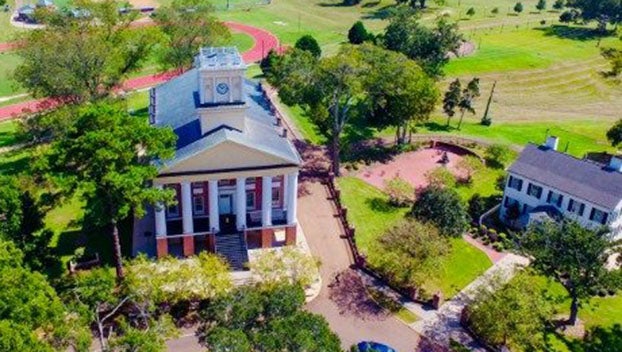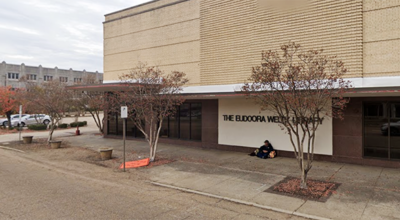Mississippi university in leadership turmoil: ‘In the effort to save money, you’ve turned the campus into a miserable place’
Published 1:55 pm Friday, October 15, 2021
Dozens of students at Alcorn State University stood in silence on the campus lawn. They wore black shirts emblazoned with raised fists and held signs that summarized the mood on campus toward the president, Felecia Nave.
“We are brave.” “Talk to us.” “Nave doesn’t care if we live or die.”
Protests are rarely seen at Alcorn, the nation’s oldest historically Black land grant university, where students face pressure to resolve issues with administration internally. But after two years of increasing unhappiness with Nave’s leadership, students and faculty say they no longer trust the president.
Jaquerius Howard, the student government president, even took the extraordinary step of writing to the Institutions of Higher Learning Board of Trustees, calling on Nave to resign because of her ineffective leadership.
“She has continuously shown a lack of empathy, transparency, and communication,” Howard wrote in a letter signed by members of the Royal Court, student government and senate.
Since the student protest at the end of September, Mississippi Today spoke with more than a dozen students, faculty and alumni. They say that since Nave became president in 2019, she has made Alcorn a tougher place for low-income, marginalized students.
Their grievances are wide-ranging. Some are systemic and ongoing: An increased workload without extra pay for faculty. Spotty WiFi, and outdated technology in classrooms. Others are focused on specific incidents, like an ice storm that left students without food for days.
The university has disputed many of these assertions in statements to Mississippi Today and the campus. In a letter to the student body addressing the protest, Nave wrote that a lack of resources has required Alcorn to take an “incremental approach” to remedy student concerns.
“Students have been my number one priority since I arrived, and they continue to be my priority,” she wrote. “At Alcorn, we remain committed to ensuring that all students have the resources to succeed.”
Unless otherwise noted, students and faculty spoke with Mississippi Today on the condition of anonymity because of fear of retribution. At a university that is isolated in rural Claiborne County, where the community cares intensely for it and feels like no one else does, it can be hard to speak up.
“In all honesty, there are already a lot of negative stereotypes about HBCUs and the African Americans who run them,” a student majoring in liberal arts said. When students speak out, he said, “we’re often met with the criticism that we’re helping to perpetuate that.”
But addressing the way Nave is leading the school is too important to stay silent.
“It’s almost like, ‘what happens in this house stays in this house,’” he said. “But that can’t really happen when what’s happening in this house is hurting me.”
When Nave was selected as president in 2019, the campus was excited. Not only would she be the first Black woman to lead Alcorn, many thought her presidency would be a turning point. Enrollment had been declining for the last three years. After decades of underfunding by the IHL board and state Legislature, Alcorn was now facing a new budget challenge as funding from the Ayers v. Fordice settlement was set to end.
Nave, herself a graduate of Alcorn, seemed poised to address these challenges.
“We thought that she was more than capable of thriving in this environment,” said Calvert White, who was a sophomore at the time. “And then we were met by lackluster policy.”
For many students, the first sign that Nave would not live up to expectations came shortly after she started at Alcorn. For years, students had participated in a weekly dance in the Clinton J. Bristow Dining Hall called “Club Cafe.” It was a tradition, a safe way for students to have fun at the isolated campus. But the summer Nave came to campus, Sodexo, Alcorn’s food-service provider, and campus police “reported increasing behaviors unbecoming of college students,” Alcorn’s spokesperson told Mississippi Today. Nave stopped allowing music.
To students, it felt like Nave didn’t understand the culture of the community she had agreed to lead.
“Students are gonna party,” said Shanique Strickland, a senior criminal justice and social work double major. “If anybody knows anything about Alcorn, from way back when we have been able to do Club Cafe. That is part of Alcorn’s culture. I would rather she cultivate an environment where we can have our fun safely instead of us having to drive far away or off campus to a house party.”
Before long, students started to lose faith. In March 2020, the pandemic hit, and Alcorn’s campus shut down. At home, many students did not have laptops or reliable WiFi. Online learning was a challenge. The liberal arts major said he had to complete homework on his phone; due to the stay-at-home order, he “couldn’t even sit outside the public library and get WiFi.”
He felt like Alcorn could have done more to help. The university partially refunded room and board in April, and allocated federal stimulus money to students in May. But Alcorn did not offer a pass/fail grading option, which made this student feel like he was “expected to perform at the maximum capability with no resources.”
“I think that definitely decreased motivation, because my GPA took a hit for something I couldn’t control,” he said.
For faculty, distrust quickly turned into animosity after Nave’s office made a series of policy changes that led to critical classes being canceled for students and higher course loads and less pay for professors.
To help teach students, Alcorn relies on instructors and adjuncts. Prior to Nave, most instructors were required to teach four courses a semester. If they taught additional courses, they would receive extra “overload” pay.
During Nave’s first semester as president, faculty were informed that classes that didn’t meet a new minimum enrollment would be cancelled, and instructors would be expected to teach five courses a semester, without extra pay.
Faculty felt blind-sided. One instructor who makes $35,000 a year said he did not know how he would afford his bills without overload pay, which had amounted to about $3,000. He also did not have enough students to teach five classes, which led him to worry about losing his job.
Faculty asked Nave to delay the new policies, but she refused, saying declining enrollment made these changes necessary “to ensure the overall stability and financial standing” of Alcorn.
“The University may not — and will not — overspend its IHL budget,” Nave wrote in a letter to faculty.
When the policies went into effect in January 2020, they also created problems for students. The liberal arts student, who attends Alcorn on a scholarship, said that courses he needed to graduate were cut due to low enrollment. His professors had to spend the first couple weeks of the semester trying to get the registrar’s office to re-offer the classes.
The new policies left “us low-income, first generation students in a pretty bad situation,” he said. “A lot of us don’t have parents that can pay tuition. We need to get out of here on time so we don’t have to pay any more than we already are.”
In response to those concerns, the university said that if a course was not offered during the year that a student was set to graduate, the university has “accommodated the student to ensure that they were able to graduate on time.”
By fall 2020, discord over these policies had reached its peak. The faculty senate requested a meeting with Nave and the provost in the auditorium to discuss their concerns that the new policies made it harder for instructors to deliver high-quality instruction. Many faculty attended.
Faculty explained they wanted more input on policies that affected course offerings and pay. But Nave pushed back: “The president of the institution makes the decision,” she said, according to a recording of the meeting.
Instructors, she continued, only wanted to keep more courses because they wanted to get extra pay.
“It is not the norm that every department sets a different class size,” she said, “because you’re trying to split the class so you can get an overload and get $2,000 more dollars.”
Faculty interpreted this as Nave calling instructors greedy. The implication was particularly insulting, faculty said, because Nave makes $240,000 a year while the average instructor makes around $40,000.
One tenured professor said he’s never seen morale so low in 20 years at Alcorn.
“Our faculty are demoralized; our students are demoralized,” he said. “What good is this? In the effort to save money, you’ve turned the campus into a miserable place.”
Tensions were already high at the beginning of this year. Then in mid-February, the ice storm hit.
One professor was sitting next to her fireplace on the night of Feb. 15 when she started getting frantic text messages from students: “They’re like, ‘we don’t have food.’”
The roads had become slick with ice, preventing dining services from getting to campus. Before long, students started trading food. Eventually, students banded together and bought meals from Pattons, a takeout joint in Lorman, to serve in the cafeteria. All the while, they heard nothing from the president.
“You would’ve thought that we did not have a president running the university,” White said. “I‘ve never seen a situation where it’s literally every student for themselves.”
Students’ disappointment with Nave’s leadership turned into anger. They questioned why the university had not adequately prepared food services for the storm.
Students also wondered why they hadn’t heard from Nave herself. Campus news and the vice president for student affairs had sent emails to students throughout the week, but Nave did not write to students directly until Sunday, Feb. 21, when she sent an update that classes would be resuming the next day.
“In our minds, we’re thinking, ‘well where is she? Is she okay? Is she somewhere comfortable and warm while we’re freezing?’” Strickland said.
In a statement, Alcorn said that Nave was communicating to students through the campus news and that the campus was informed “of revised hours of operations due to the inclement weather” at the cafeteria.
The anger about the storm carried over into April, when Nave was formally inaugurated in the chapel on campus. Prior to the ceremony, banners with Nave’s face on it were strung up across campus, and Strickland noticed that some roads were repaved and lined with flower beds. Alcorn said these changes were part of “the continual beautification of campus.”
When White walked into the cafeteria that week, he was shocked at the bounty compared to what it was like during the ice storm.
“It was like wonderland: We had a popcorn machine, there was snow cones, we had f—in’ crawfish,” he said.
Burnt out and traumatized by the ice storm, White transferred to Jackson State University to finish his studies at the end of the spring semester.
Not long after students gathered outside Nave’s office for the protest in late September, she asked them to meet her inside the Old Gym for a town hall. For two hours, students questioned her about the longstanding issues they wanted to see addressed.
The tenured professor watched a Facebook livestream of the town hall in astonishment. He told Mississippi Today he could remember just one other time students protested the administration.
“There’s no tradition of challenging authority here with just a few exceptions,” he said. “I’m frankly surprised the Student Government Association led a protest and requested the president resign. It’s unheard of for Alcorn.”
Nave sent out a letter to students after the town hall. She wrote that the protest had “deeply saddened” her, and she pledged to be more visible on campus, to “enhance student engagement,” and to “strengthen the technology infrastructure.” Then she listed her accomplishments during her last two years as president.
“As I said when I arrived,” Nave wrote at the end of the letter, ‘We are Alcorn. I am Alcorn.’”
The words rang hollow to many students and faculty. They want real change. And now, alumni are involved. Several concerned graduates have come together to create a group called Alcornites for Change. They have posted a survey on their website to gather feedback, the results of which they hope to use to hold Nave accountable.
“The day those kids protested … it opened a vast majority of people’s eyes,” said Jared Gilmore, one of the alumni group’s organizers.
Ultimately, many no longer see the president as synonymous with the university. That’s the central frustration for the tenured professor who spoke to Mississippi Today — that Nave has convinced some on campus she is “the brand.”
“Any university that understands its mission understands the students are the brand,” he said, “not the freaking buildings, not the administration and certainly not the president.”
By Molly Minta, Mississippi Today
More News






